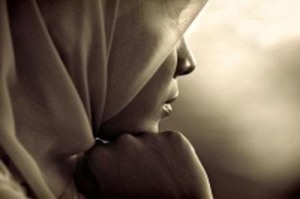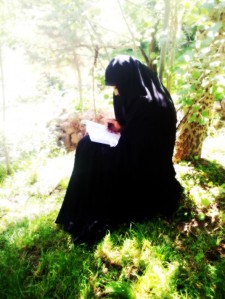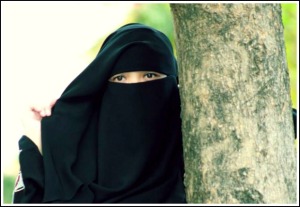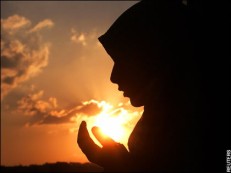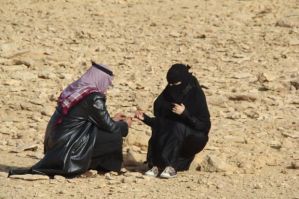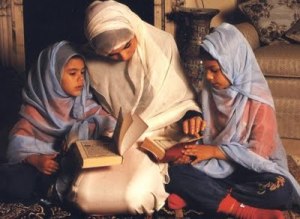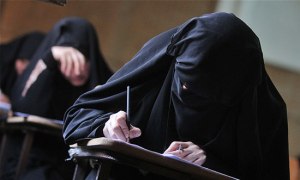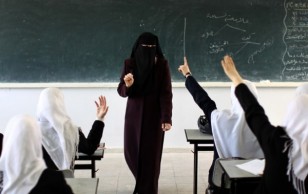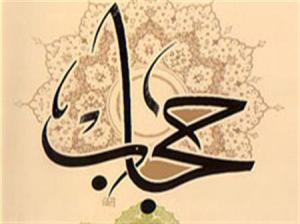 In the name of Allah, the Most Compassionate, the Most Merciful
In the name of Allah, the Most Compassionate, the Most Merciful
In modern English, when we use the word ‘hijab’, we are referring to the headscarf or the modest dress worn by Muslim women. The same is true of modern Arabic and most Islamic languages. However, as a matter of fact, the Qurán does not use the word ‘hijab’ in reference to women’s dress. When the Qurán wants to tell us about how women should dress, other words such as jilbâb or khimâr are used.
The word hijab appears several times in the Qurán: only twice in reference to women, and never in reference to women’s dress. In this essay, I am not going to talk about the concept of hijab or the modest dress in Islam. I am going to discuss the verses of the Qurán in which the word hijab is used. Thus, I will not mention those verses in Surah An-Nur and Surah Al-Ahzâb that are especially about Muslim women’s dress. I shall limit myself only to those verses in which the word hijab is used.
So what does hijab mean? Hijab, in its Quranic sense, means ‘concealment’, ‘covering’ or ‘veil’. Everything that comes between two things is a hijab: everything that acts as a barrier between two things. When the sun is hidden by the clouds, we can say that the clouds are its hijab. When seeds are hidden beneath the earth, the earth becomes a hijab for those seeds. When the female part of the flower is covered with leaves and petals, you can say that it – or she – is wearing a hijâb!
Therefore, when Allah used the word hijab in the Quran, it means ‘barrier’ in general. It can be any kind of barrier: it can be a wall, a curtain, a leaf, a cloud, or anything else. If we define the word hijab in its Quránic sense, the modest dress worn by women would be only one particular kind of hijab. It would be one example of hijab, which the Quran nevertheless refers to as jilbab or khimar.
The Word Hijab in the Qur’an
Now, let us consider some examples of the word hijab in the Qurán:
In Surah Al-A’râf, when Allah tells us about the people of Hell and Heaven, He mentions that: wa baynahumâ hijâb; meaning:
Between them is a barrier. (7:46)
There is a barrier (hijab) that separates the people of Heaven from the people of Hell. I personally think that even in this world these two groups are separated: maybe not physically but they are separated mentally. There is an invisible veil that separates pious people from greedy people. They cannot even understand one another.
We have this concept of invisible veil also in Surah Al-Isra’ of the Qurán:
When you recite the Quran, We put between you and those who do not believe in the Hereafter an invisible veil. (17:45)
The Qurán uses the term hijâban mastūran which literally means ‘hidden veil’ or ‘veiled veil’. Hence, when we read our scripture, Allah puts an invisible hijab between us and worldly people.
In the Qurán, there are also verses that mention the hijâb between evil-doers and the Creator. Allah says in the Surah Al-Mutaffifin:
Nay, but that which they have earned is the stain that has covered their hearts! Nay, but surely on that Day, they will be covered from their Lord (17:45)
May Allah protect us from this kind of hijab! It seems that evil-doers also wear a hijab, but their hijab does not protect them from prying eyes. Their hijab separates them from God!
The word hijab is also used in the story of Prophet Solomon – upon him be peace-. Allah describes the setting of the sun in this way: hattâ tawârat bil-hijâb
The Sun was hidden in the veil. (38:32)
In this verse, the word ‘hijab’ is used in reference to the night. So, the night can also be a hijâb, a veil that covers many things!
In the story of Sayyidatnâ Maryam – The Virgin Mary, peace be upon her -, Allah mentions the word hijab to refer to the partition that the blessed virgin placed between herself and the Jews. Allah – Glory be to Him – says:
She placed a screen (hijab) between her and her people. Then, we sent unto her Our Spirit. (19:17)
So hijab was also practiced by Maryam – peace be upon her – for she secluded herself from the people and devoted her life to prayer and fasting. It is plausible that Allah sent the Angel Gabriel unto Mary – peace be upon her – after and not before she chose seclusion from the Jews. From this, we learn that it is better to put the hijab between oneself and worldly people than to put the hijab between oneself and Allah. In any case, hijab is not only the wont of the wives and daughters of the Prophet – upon him be peace – but it is also the way of Sayyidatnâ Maryam, who was chosen over all women.
The Verse of Hijab
The verse of hijab (âyat al-hijâb) refers to verse 53 in Surah Al-Ahzâb which mentions the barrier between men and women in the Prophet’s house. Contrary to what some people think, the verse of hijab does not refer to the verse in Surah al-Nur which mentions the rules of modest dress for Muslim women. This verse in Surah Al-Ahzab has an interesting narrative attached to it that is found in the books of hadith. Here is a summary:
When the Prophet – upon him be peace – married Zaynab bint Jahsh, he invited the companions to his house for a feast. The companions came and ate with the Prophet. When they were fed, most of them left except for a few who remained with the Prophet and engaged in conversation. This was probably because these companions had great love for the Prophetpbuh; and desired to be in his presence as long and as often as possible. On that occasion, the companions were unwilling to leave and the Prophet was too shy to dismiss them. So, he – peace be upon him – rose to his feet and went to the women’s quarter within the house. He hoped that the companions will also leave and go to their homes. After a while, the Prophet returned to the men’s quarter and found that the companions had not left yet. The Prophet was still too shy to dismiss them; so he went to the women’s quarter again and this time Anas ibn Malik – who was a young servant of the Prophet – followed him. The Prophet drew a curtain between Anas and himself and this verse was revealed:
O ye who have faith, enter not the dwellings of the Prophet unto a meal, without waiting for its time to come, except if leave be given you. But if you are invited, then enter. When the meal is ended, then disperse. Linger not in hope of discourse and conversation. Verily, that would be irksome unto the Prophet. He would shrink from telling you, but Allah shrinks not from the Truth.
And when you ask of them (the Prophet’s wives) anything, ask it of them from behind a curtain. This is purer for your hearts and for their hearts. (19:17)
From this verse and the ahâdith related to it, we learn that in the house of the Messenger of Allah, there was a space allocated to men and a separate space allocated to women. There was also a ‘curtain’ (hijâb) which separated the two spaces. Allah commands the companions to respect this hijâb and if they need to ask anything of the Prophet’s wives, to ask it ‘from behind the curtain’.
Thus, one can say that this separation of men and women – when there are guests in the house – is also of the Sunnah of the Prophet. Before modern times, this tradition was followed in most Muslim countries. In traditional Indian architecture, houses were divided into two parts: the women’s inner apartments or zenana, and the men’s outer quarters or mardana. Likewise, in traditional Persian architecture, there was a partition between the private section andarūni – and the public section of the house birūni. Even today, in many Arab houses, men and women do not sit in the same area, unless they are closely related. The partition, however, was more or less forgotten with the rise of modern architecture. Nowadays, some Muslims tend to opt for open kitchens because of modern design, whereas this type of design completely disregards the privacy of women. When the kitchen has neither walls nor doors, women will not be able to do kitchen-work without being watched by the male guests. Anyway, let us go back to the verse of the hijab.
It’s only not about dress!
It is clear that the verse does not say anything about how men and women should dress. As for the ruling on women’s dress when they go out of the house, one should refer to the verse in Surah An-Nur and the other verses in Surah Al-Ahzab. In this verse, Allah tells us about the separation between men and women in the house; and that can be done not only by clothing, but also by walls or curtains. Of course, this kind of hijab – curtains and walls – is only possible indoors and not in the street. That is probably why women were told to cover their bodies when they go out of the house.
Only the wives of the Prophet?
Some people say that this verse pertains only to the wives of the Messenger of Allah – peace be upon him- and that other women do not have to follow this injunction. This view is plausible, as the wives of the Prophet were held in great respect by the Muslims and their status was not like that of other women. However, there are several points for us to consider:
First point: Sometimes, Allah does not give us the reason for a particular commandment. Allah tells us to pray two rak’ahs at Fajr. Why two rak’ahs and not three rak’ahs? Allah does not tell us the reason. Here, however, Allah tells us clearly why the hijab is needed and why there should be a barrier between men and women. Allah gives us the philosophy behind hijab: This is purer for your hearts and for their hearts. (19:17) Therefore, the ultimate reason for hijab is the purification of the hearts. This is the reason (‘illa) behind the hijab.
Now, according to a principle in fiqh: If the reason remains, the injunction also remains. So, for example, a doctor tells patient A not to smoke because that may lead to cancer. Now, if patient B also wants to avoid getting cancer and if his health condition is similar to patient A, then the same ruling also applies to patient B. When Allah commands a particular group of people to do something for a particular end, and that end is also desired in another group of people, then the command must be followed by both groups.
So the question is: whose heart needs to be purified most? Is it the hearts of the Sahaba and the wives of the Prophet, who were the best men and women of all generations? Or does it apply to us as well, for our hearts needs purification more than their hearts?
Second point: There is an Arabic saying that goes: iyyâka a’ni was’ma’ē yâ jârah. There is a story behind the proverb. I’ll tell you the story before I translate the saying: Once upon a time, an Arab man fell in love with his neighbour’s daughter but he was too shy to express his love openly. Thus, he composed a love letter to the tent! In this letter, he spoke to the tent and praised the beauty of the tent and so on – but at the end, he wrote: iyyâka a’ni was’ma’ē yâ jârah – I’m speaking to the tent, but O neighbour’s daughter, hear it!’ In other words, outwardly I am speaking to the tent; but in reality, you are the subject of my thoughts. I am speaking to no one but you.
Sometimes, Allah’s verses in the Quran are like that. For example, Allah says to the Prophet – upon him be peace -:
If you should associate anything with Allah, your work would surely become worthless, and you would surely be among the losers.” (39:65)
Is it possible for someone like the Messenger of Allah – peace be upon him – to even think of committing shirk? Of course not! So, this verse apparently addresses the Messenger of Allahpbuh but Allah knows that the Prophet will never commit shirk. In this way, he is warning the people and the believers. The verse says that even the Prophet’s works would become worthless, then what about yours? So we should not be so sure of ourselves.
Or, another example, the Prophet said:
By Allah! If Fatimah, the daughter of Muhammad, were to steal; Muhammad would surely cut her hand off.”
Is it even possible that Fatimah – May Allah be pleased with her –, one of the four chosen women in Paradise, should even think of stealing?!! No. That is impossible. So why did the Prophet mention Fatimahraa? He mentioned Fatimah – May Allah be pleased with her – to emphasize that the rule of Law has no exceptions.
Likewise, the verse of hijab outwardly addresses the wives of the Prophet – May Allah be pleased with them –– whereas in reality all men and women must follow and respect this Qur’anic injunction. For if the hijab was needed for those saintly men and women, it is definitely more needed in our times. This is the view expressed by many Quranic commentators, such as Al-Jassâs, Ash-Shawkâni, Ash-Shaqniti, Ibn Jarir and others. Ibn Kathir – May Allah have mercy with him – also says: ‘If one wants to ask something from a woman, he should ask from behind a screen.’
Hijab does not mean no communication!
Finally, we should remember an important but often forgotten point. Allah does not say: ‘Do not ask anything of the Prophet’s wives.’ Allah does not say: ‘Do not ever speak to the Prophet’s wives’. Allah says: ‘When you ask anything of the Prophet’s wives, ask it of them from behind a curtain.’ So the Islamic hijab does not mean that there should be no communication between non-mahram men and women. It means that this communication should always take place from behind a hijab. This view is also supported by the Sunnah: Many of the Sahaba – male companions of the Prophet – would ask their questions from A’isha; and she – May Allah be pleased with her – would answer. She would tell them about the Messenger of Allah; but she would do so from behind a screen. There should always be a hijab in between.
This hijab can be a curtain or a wall in the house, it can be modest dress, and it can also mean our behaviour, our thinking and our piety. Outward hijab is not efficient if it is not accompanied with inner piety. Inner piety always manifests itself in modest dress and behaviour. Piety is, by itself, the most important and the most efficient hijab; for it is piety which gives meaning to modest dress. Piety is the invisible hijab that all Muslim men and women must wear. As the Qurán also says in Surah Al’-A’râf:
And the garment of piety: that is the best garment. (7:26)

